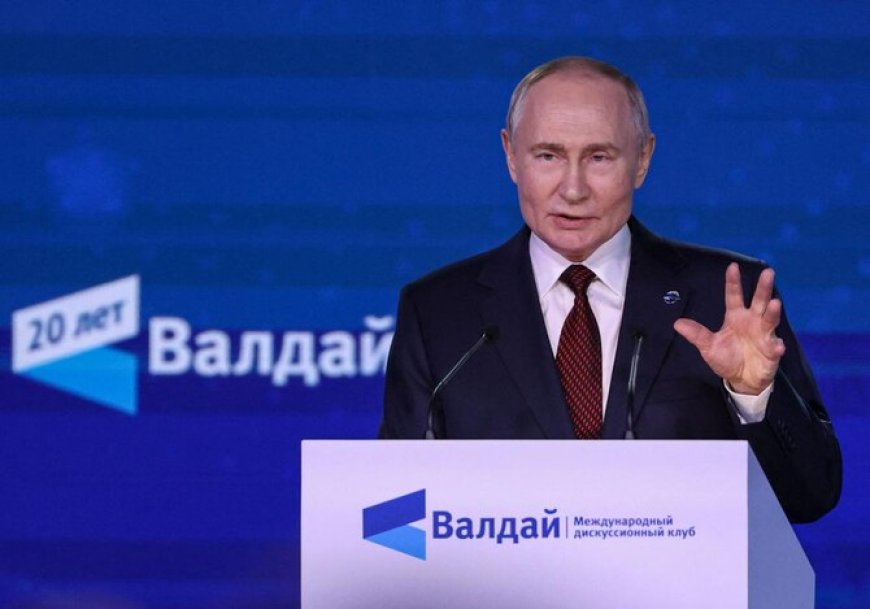Russia's Recent Nuclear Show of Force: A Resounding Message from Putin to Trump ?

By: M. Sharifi
As Western powers persist in their unchecked support for Ukraine often celebrating the intensification of attacks on Russian soil--- the Kremlin has responded with a formidable display of military might that not only raises the alert level of its armed forces but also reinforces Russia’s unshakable resolve. In a bold move to reaffirm its preparedness for any eventuality the Russian military staged an elaborate nuclear exercise simulating a massive response to an enemy’s first nuclear strike. This demonstration which took place recently comes at a time of rising global tensions--- underscoring Russia’s unwavering commitment to defending its sovereignty and reinforcing its status as a formidable nuclear power.
The exercise involved the launch of a [RS24] Yars-type intercontinental ballistic missile (ICBM) from the Plesetsk cosmodrome on the Kamchatka Peninsula. The Yars missile a thermonuclear weapon developed in 2007 is capable of carrying up to four warheads which can be independently targeted to strike multiple sites. This precision and capability underscore the Russian military’s determination to respond effectively to any nuclear threat In addition Russia’s Ministry of Defense revealed that two nuclear submarines launched ballistic missiles while Tu95 strategic bombers armed with long-range cruise missiles also took part in this critical demonstration over the Arctic’s Barents Sea and the Sea of Okhotsk.
This military exercise is clearly a response to NATO’s own nuclear drills which took place just days earlier. The exercise named Steadfast Noon saw 2000 soldiers from 13 NATO member states and 60 fighter jets conduct war games in Northern Europe all designed to test the alliance’s nuclear readiness. The timing of Russia’s exercise was no coincidence---Moscow sought to send a clear and calculated message to NATO that it remains resolute in its nuclear deterrence capabilities. As Russian President Vladimir Putin remarked during the drills Given the growing geopolitical tensions and the emergence of new foreign threats and dangers it is of great importance to have modern strategic forces that are constantly ready for use. He emphasized the necessity of nuclear weapons in safeguarding Russia's national security asserting that the country would continue to refine its strategic deterrent with the nuclear triad remaining an indispensable guarantee of Russian sovereignty.
What is perhaps even more concerning than the nuclear rhetoric itself is the geopolitical message Russia is sending: Moscow is prepared to confront any external threat with decisive force including the use of nuclear weapons if necessary. Putin’s words serve as a stark reminder that Russia views its nuclear arsenal as an existential safeguard---one that will be deployed without hesitation in defense of Russian interests. The Kremlin’s unyielding stance is clear: Russia will not shy away from using its military power to protect its sovereignty no matter the adversary---including NATO.
However there is a more subtle layer to this military posturing: the timing of the exercise and its potential connection to the recent U.S. presidential election. With Donald Trump having won the presidential race and the political climate in the U.S. sharply divided experts suggest that Russia’s nuclear show of strength may have been strategically aimed at influencing American public opinion. Polling data indicates that American voters are deeply concerned about the escalation of conflicts particularly in Ukraine and Gaza with many fearing the potential for a global nuclear war. In this climate of uncertainty Trump has positioned himself as the candidate best equipped to prevent such a catastrophic outcome. His rhetoric has frequently included warnings that World War III would become an inevitability if Vice President Kamala Harris had won positioning himself as the voice of reason who can avert global conflict through diplomacy and strategic restraint.
With the political dynamics in the United States now settled with Trump in office Russia’s actions were undoubtedly designed to amplify the perception that Trump a former president known for his direct engagement with Putin might offer a more stable and cooperative approach to international relations. This line of thinking however is not without its complexities. Although Trump has repeatedly expressed a willingness to engage in direct communication with Russian leadership some analysts note that during his presidency he imposed numerous sanctions on Russia and introduced unprecedented restrictions on bilateral relations. Nonetheless Putin’s apparent preference for Trump—despite the sanctions—suggests that Russian leadership sees potential in restoring diplomatic ties that could ease tensions especially when contrasted with Harris’ more confrontational approach during her time as Vice President.
The current state of U.S.-Russia relations is at a historic low and any promises of improved ties are likely to be met with skepticism. President-elect Trump faces the difficult task of navigating the deeply entrenched ideological divide that has grown since the end of the Cold War with Russia’s military interventions and its strong defense of its interests in Ukraine serving as a focal point of tension.
In the final analysis Russia's recent nuclear exercise is a multifaceted maneuver—one that seeks to project power enhance deterrence and potentially influence the trajectory of U.S. politics. It is a demonstration of Russia's unshakable resolve in the face of external threats but it is also a reminder of the delicate balance of power that continues to define global politics. As Moscow strengthens its nuclear deterrent the rest of the world watches closely aware that the actions of today may have profound implications for tomorrow’s international order. With the United States now under the leadership of President Donald Trump the stakes have never been higher and the messages being sent by Russia will likely resonate far beyond the borders of Eastern Europe.













































